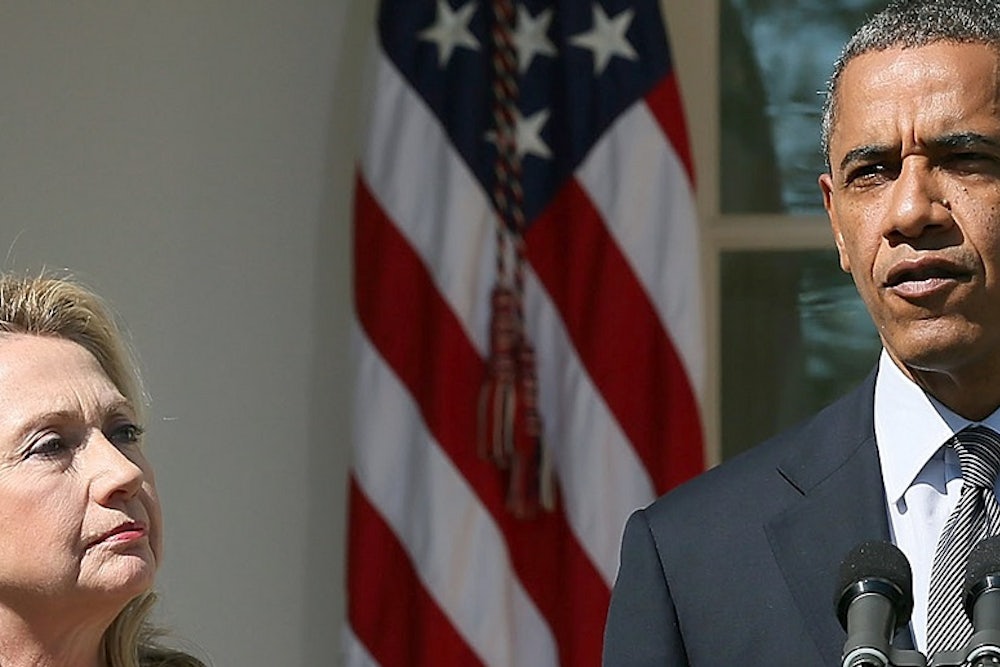Liberals are optimistic about Democrats retaining the presidency in 2016, but they live in fear of one big thing: Hillary Clinton, for whatever reason, deciding against running. The odds of that are small—some may even say infinitesimally small—but Democrats have almost no other national candidate that is primed for a successful presidential run.
That weakness is a political problem for Democrats only if Clinton chooses to pass on the election. Otherwise, the party has four or eight years to develop new candidates. But more importantly, and contrary to New York Times columnist Ross Douthat’s Sunday column, the party is in strong shape because of its policy agenda, the corresponding weakness of the GOP’s platform, and the demographic shifts in the U.S.
In his piece, Douthat writes that "Clinton’s iconic status is, increasingly, the only clear advantage the Democratic Party has. If her position is weakened, diminished or challenged, the entire coalition risks collapse. Liberals don’t see this clearly yet because they tend to regard the Obama coalition as a left-of-center mirror-image of Nixon’s and Reagan’s conservative majority—a natural, settled and, thanks to demographic trends, growing presidential majority (if not a congressional one) that should deliver the White House to their party reliably for cycles to come.”
Douthat’s lip service to the Republican Party’s demographic problem understates the extent of the issue. America is becoming more diverse and Hispanics are becoming a larger part of the electorate. And Hispanics are becoming a stronghold of the Democratic coalition. The party may have no other national candidate with presidential prospects besides Clinton, but this structural advantage is only likely to grow in the coming years. Democratic confidence in creating a presidential majority stems from this belief. It’s hard to say whether that confidence is overstated—Republicans may decide to pass immigration reform and adopt other policies to woo Hispanic voters—but they are confident for a very good reason.
The other reason that Democrats are optimistic about 2016 and beyond is the policy platform of the two parties. Douthat also writes, “Political skill builds majorities, but popular policy successes cement them—and that is what has consistently eluded Obama. He resembles Reagan when it comes to electoral-majority building, but he’s a Reagan without the economic boom, without the foreign policy achievements and without the high approval ratings.” He’s right about all of those things, of course. The economy isn’t booming. While Obama’s approval rating has rebounded a bit since Obamacare’s horrible launch, more Americans still disapprove than approve of him. But we cannot just analyze the politics of Obama’s policy choices in a vacuum. The Republican Party’s agenda matters too.
Douthat is a member of the reform conservative wing of the Republican Party. It’s a collection of smart, policy-focused conservatives that are looking to build a thoughtful agenda. In recent months, they have had a number of successes in gaining traction within the GOP: from Marco Rubio’s new antipoverty agenda to the release of a new book Room to Grow. But there’s no doubt that reform conservatives still are a quiet voice within the Republican Party. While reformicons, as they are sometimes called, are open to expanding the social safety net, particularly by expanding the Earned Income Tax Credit, increasing spending on antipoverty programs is the exact opposite of the current Republican agenda. That agenda is laid in Paul Ryan’s budget, which would make massive cuts to programs for low-income Americans.
The party has also often locked itself into a position where it cannot govern. Say what you will about the Obama presidency, but he has accomplished a lot. He passed universal health care and the Dodd-Frank regulatory law. With the announcement of new EPA regulations on greenhouse gas emissions last week, he has done more than any other president on climate change. Whether you like his policies or not, Obama has governed. The same cannot be said of the GOP. For instance, as the Washington Post’s Greg Sargent has often written, House Republicans are unable to pass any type of immigration reform, because they cannot agree on what it should look like. Republicans never had any jobs agenda to help us recover from the financial crisis. On health care and tax reform, political promises have made it almost impossible for them to propose conservative ideas. Americans have not greeted Obama’s policy platform with cheers, but they recognize the dearth of policies in the current GOP agenda.
And that’s the ultimate problem with Douthat’s column: he ignores the unpopularity of the Republican policy platform. Americans don’t like the Paul Ryan budget. They don’t like the party’s stance on immigration. In cutting the deficit, they would rather use a combination of increased taxes and spending cuts, instead of spending cuts alone. Americans may not like Obamacare, but they would rather fix it than repeal it. For Obama’s policy agenda to become a political failure, it requires Republicans to offer a competing vision that persuades voters. Douthat’s reform conservatives have such a vision, but the Republican Party, right now, does not.
